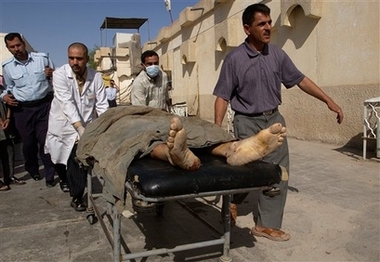A suicide car bomb tore through buses carrying Iranian pilgrims Thursday near
a Shiite shrine in the holy Iraqi city of Kufa, killing at least 10 people and
wounding 40, authorities said.
The attack occurred about 7:15 a.m. near the Maitham al-Tamar shrine and just
down the street from the revered Kufa mosque in the southern city. Iraq's
council of ministers issued a statement giving the casualty toll and said most
of the victims were Iranian pilgrims.
|

The body of a victim in an early morning car
bomb attack is brought to a local hospital morgue, Thursday, July 6, 2006,
in Kufa, 160 kilometers (100 miles) south of Baghdad, Iraq. A suicide car
bomb targeting Iranian pilgrims struck near a Shiite shrine in the holy
city of Kufa on Thursday, killing at least 12 people and wounding 37,
police said. [AP]
|
Tehran condemned the attack and called on the Iraqi government to bring those
responsible to justice. It also blamed US-led forces for failing to provide
security.
Police at the scene said the suicide attacker was driving a minivan behind
two buses and detonated his explosives as the pilgrims were getting off. The
buses were destroyed and a mosaic-lined wall of the shrine was damaged.
Nobody claimed responsibility for the attack, but suspicion fell on Sunni
extremists amid rising sectarian tensions in the country.
"The purpose is clear - to stop pilgrimage. I suspect that the criminal
Baathists are behind this act," the governor of nearby Najaf, Asaad Abu Kallal,
said, referring to members of Saddam Hussein's ousted party.
Radical Shiite cleric Muqtada al-Sadr also denounced the bombing. "It was
meant to shake the stability in Najaf," said his aide, Sahib al-Amiri.
Kufa and its twin city Najaf, 100 miles south of Baghdad, are in a relatively
peaceful area.
Iran's Foreign Ministry spokesman, Hamid Reza Asefi, called the bombing
"barbaric terrorist act" and singled the Americans out for blame.
"The wrong approach of occupying Americans and their failure to be
accountable in Iraq has spread violence and terrorism in this country.
Terrorists, relying on America's wrong approach, continue their crimes,"
state-run television quoted Asefi as saying.
The attack came as Iraqi Prime Minister Nouri al-Maliki returned to Iraq
after a regional tour to drum up support for his 24-point national
reconciliation plan.
The Shiite leader on Wednesday demanded an independent inquiry of the
rape-slaying of an Iraqi girl and the killing of her family, as well as a review
of the immunity rules protecting US forces from Iraqi prosecution.